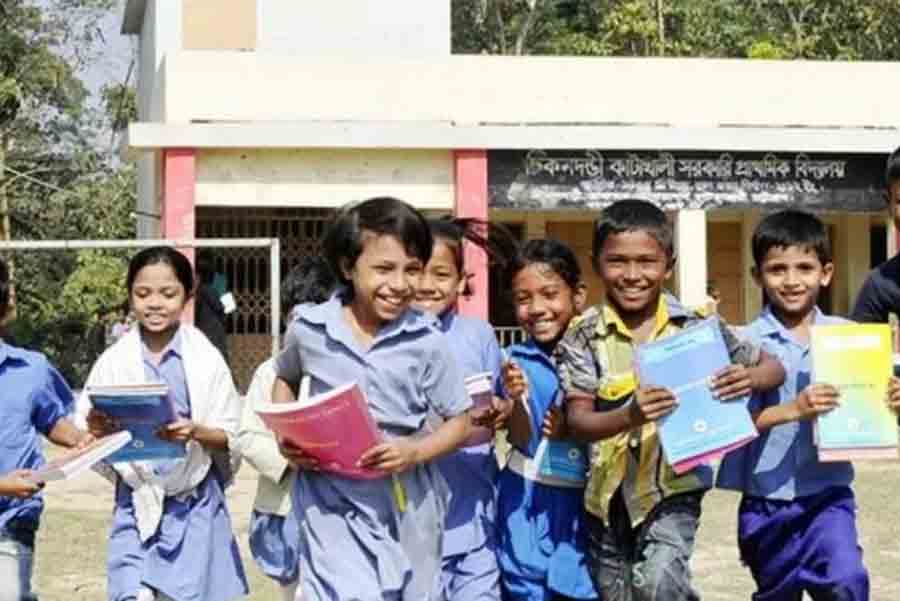
Published :
Updated :

Bangladesh could avert an economic loss equivalent to 11 per cent of its gross domestic product (GDP) by ensuring that no child drops out of school, according to a report by the United Nations Educational, Scientific and Cultural Organization (UNESCO).
The potential gain could increase to as much as 26 per cent of GDP if all children attained basic skills, the report titled "The Price of Inaction: The Global Private, Fiscal and Social Costs of Children and Youth Not Learning," added.
The key findings of the report were presented on Thursday at a roundtable discussion jointly organised by the National Academy for Educational Management (NAEM) and UNESCO, held at the premises of the Centre for Policy Dialogue (CPD) in Dhaka.
Noorjahan Khatun, Additional Secretary of the Ministry of Primary and Mass Education, Dr Zulfikar Hayder, Director General of NAEM, Dr. Khan Moinuddin Al Mahmud Sohel, Director of Secondary Education at the Directorate of Secondary and Higher Education; representatives from UNESCO and experts, economists and educators spoke at the event chaired by Dr Manzoor Ahmed, Professor Emeritus, BRAC Institute of Educational Development.
Speakers said at the event that political commitment was crucial to ensure quality education in Bangladesh.
They pointed out insufficient investment in the education sector, lack of accountability, and limited social awareness as key challenges, calling for a fundamental transformation in the country's primary and secondary education system.
Highlighting the importance of investing in education, the report noted that a 1.0 per cent reduction in early school leaving could generate a gain of $630 million for Bangladesh, while reducing by 1.0 per cent the number of children lacking basic skills could yield an even higher benefit, estimated at $1.2 billion.
The report also found some significant non-monetary cost for learning gaps and said inadequate basic skills were linked to a 55 per cent higher likelihood of youth not being in employment, education, or training (NEET), and a 92 per cent higher rate of early pregnancies.
Globally, the annual social cost of children leaving school early amounts to $6 trillion, and for children lacking basic skills, the cost rises to $10 trillion, the report found. South and West Asia, including Bangladesh, bears some of the highest losses -- up to 32 per cent of GDP by 2030 due to inadequate learning.
The report also warns of the consequences of ignoring socio-emotional skill development. By 2030, low socio-emotional skills could cause a global GDP loss equivalent to US$7 trillion, or 19 per cent of annual output. These skills are crucial predictors of academic success and can help reduce dropout rates.
According to UNESCO, even a 10 per cent reduction in early school leaving and low learning levels could boost Bangladesh's GDP by 1-2 percentage points annually.
To reverse these trends, the report urges governments and partners to step up investment in education to achieve Sustainable Development Goal 4 (SDG 4) -- ensuring inclusive and quality education for all by 2030.
It recommends providing 12 years of free, publicly-funded, inclusive, and quality education; investing in early childhood education and development; creating learning environments; avoiding early tracking and offering second-chance opportunities; improving school infrastructure and teacher training; engaging communities to raise awareness about education's importance; integrating health, mental well-being, and real-world skills into schooling; and expanding data and evidence on effective interventions.
Speakers at the roundtable emphasised that investing in education was not just a moral imperative but also a cost-effective strategy for economic growth.
Without decisive action, they warned, Bangladesh risked facing higher rates of early pregnancy, youth unemployment, and social instability -- costs that far outweighed the investments required to ensure quality education for all.
Speakers warned that Bangladesh faced alarming gaps in education quality and access, stating that dropout rates reached 13.95 per cent in primary schools and 32.85 per cent in secondary schools, with some remote areas losing a half of their students before secondary education completion.
Only 50 per cent of fifth-graders can read Bangla properly, and 30 per cent meet math standards.
They noted that education spending was just 1.8 per cent of GDP, for below the recommended 5 per cent.
jahid.rn@gmail.com


 For all latest news, follow The Financial Express Google News channel.
For all latest news, follow The Financial Express Google News channel.